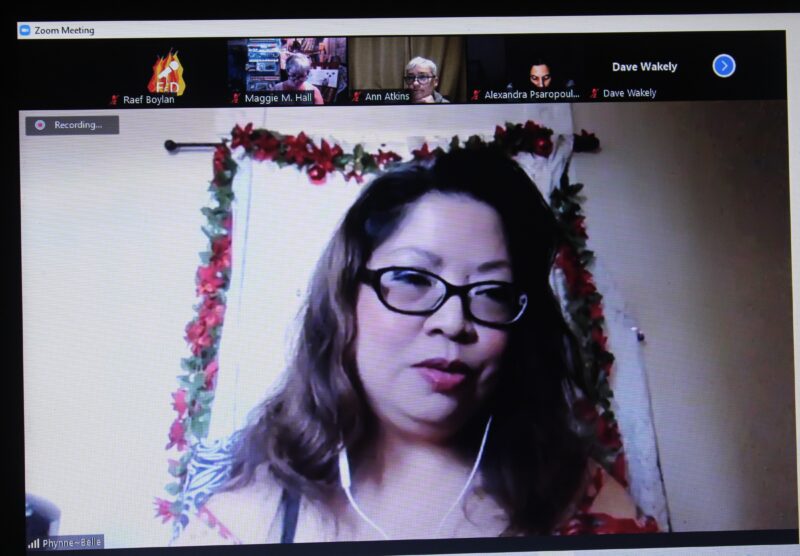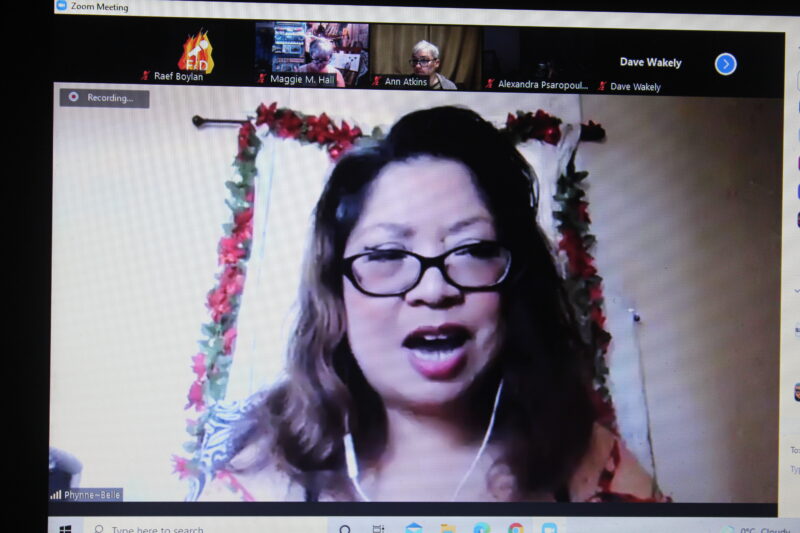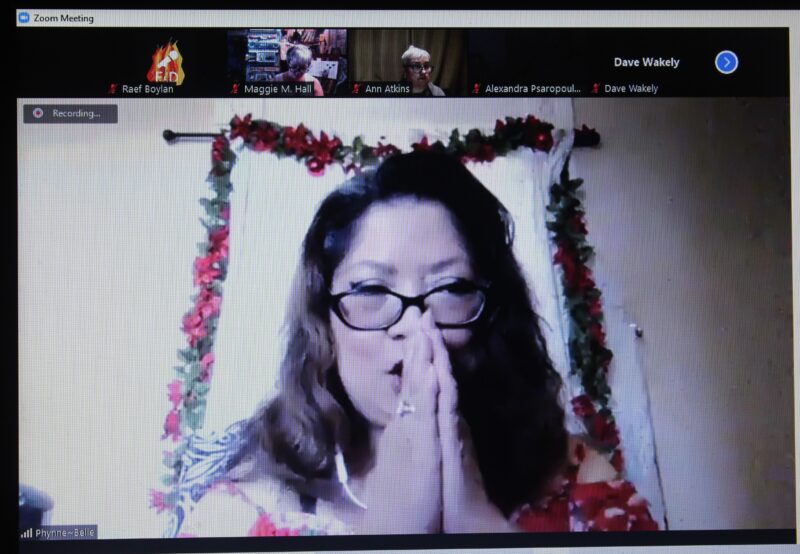INTERVIEW: FIRE & DUST MEETS PHYNNE~BELLE
Phynne~Belle is a poet, writer and animal lover who lives in the San Francisco Bay Area with “too many cats and dogs”. She has recently had her poetry featured in Postall Magazine’s inaugural issue “Beginnings”, in addition to having pieces included in two recent poetry anthologies – Sinew: Ten Years of Poetry in the Brew and The Bronx Memoir Project Anthology Vol. V. Phynne is passionate about crafting events and programmes that make the literary arts (poetry in particular) widely accessible. She is host of PGN’s The Poet’s Lighthouse as well as the Phynnecabulary podcast on Spotify. You can also find her hosting her weekly online open mic every Thursday. She also posts regularly on both Vocal and Medium under the name Tricia De Jesus-Gutierrez. In 2017, Phynne~Belle published her debut poetry collection, titled Some Days, Here (AuthorHOUSE Publishing).
Phynne~Belle was our first virtual headliner of 2022 at the Fire & Dust poetry event on 13th January. We caught up with her after the gig, to ask a few questions…
HCE: Tell us a little about your background and journey as a writer so far. What inspired you to start creating and performing poetry?
PB: I was asked recently about when I began writing. When I had the moment to contemplate the question a bit, I realized that I had been writing (or at least storytelling) for as long as I can remember, as a very young child, concocting tales to go with playing make-believe. I found the stories were not content to merely remain inside the play realm; they begged for backstories, continuations to their adventures. I found they kept telling themselves, and I soon had to catch up with them, by committing them to pages in diaries, and then journals as I got older, to scraps of wrapping material or napkins or any material I could get a hold of, as an idea would suspend itself in front of me and begin to coalesce.
Around the time of autumn of early 2000, I was working in a bookstore, very much entrenched in book & writing culture, so I thought to try NaNoWriMo for a little fun fall project. Writing at a frenzied pace on a daily basis unlocked something I didn’t realise lay dormant below the surface: this desire to faithfully chronicle how I perceive and process my world. I was enamoured of Basho at the time. I decided to write my novella project, and then write about that experience and my observations about the process in poetic short form.
Would you believe me if I said that I never ascended a stage to perform, prior to the pandemic? I have horrific stage fright – I would’ve never been able to transfer the positive energy and the sense of doing something that “fits” from the Zoom realm to real-life poetry events, had it not been for this period of having to find alternatives for sharing our art. Many have said this, and it has been true for me: the presence of this global community through the difficult period of the pandemic has been a buoy for me, in an otherwise bleak scenario.
HCE: Would you say there are themes or motifs that you tend to gravitate to in your work?
PB: I have tried to steer clear of writing about love in all its forms, but it seems to be a theme that wishes to follow me around. I’m heeding its persistence – I always think of themes that recur, and bring themselves to the forefront, despite my initial rejections, as having lessons, slightly-coded messages that I am meant to decipher and take to heart.
I do tend to write a lot more in recent years about being Filipino-American, having lived much of my formative years in the Philippines. How this has shaped my experience of being a Third Culture individual, and how I shift in this existence, sometimes a painful experience, sometimes successfully straddling the not-always-invisible divide.
I lost my dear mama two years back to health complications surrounding her rapid onset-dementia. I lost my beloved dog, Marbles, three years prior to my mama’s passing. I feel now that I do want to take out and explore my grief in writing. Baby steps.
HCE: Several of the poems you performed resemble a passing-on of wisdom. Who is your work aimed at – do you have an ideal audience in mind when you’re putting a poem together?
PB: I think that because my poems end up being sort of a form of love letters to my own self at different stages of my life, they are also, unsurprisingly, love letters to my sisters, all women, wherever they are in their life’s journey. I like to imagine that a more sage, mature current incarnation of me whispers back assurances and affirmations to younger, unsure versions of myself, hoping the advice, the “you’ll be alright” arcs over time and space.
HCE: Is there a particular message you’re hoping that readers take away from your book Some Days, Here?
PB: I think…if one person reading a particular poem between its cover nods to themselves and thinks, “I know the feeling. This is about me,” I am incredibly gratified. I have made that connection with another soul through human experience to which we can all relate, to which we all bear a commonality.

HCE: For you, what do most well-written poems have in common?
PB: Poetry must contain the smallest speck of truth as its core, no matter its topic, or how fantastical its devices or form are. The fact of having truth grounding it is what maintains its storytelling unshakable, riveting, hard to put out of one’s mind.
HCE: Tell us a bit about the podcasts and events you host. Is it difficult finding time to juggle them all, on top of your writing and personal life?
PB: I must say, venturing into putting so much behind the events and podcasts I create has been the best possible way to clarify a life-work balance; you find you simply must prioritise what is essential. You let go of what is beyond your power and what is not serving your core goals. It has heightened in my mind how precious and crucial having a space that is about personal pursuits that bring joy, is about carving essential time, energy, and place for my writing is, and how this must supersede a standardised concept progress, an upward trajectory of success. These are all unique and individual to the person involved.
HCE: What, in your opinion, are the essential ingredients for a good poetry open mic?
PB: No doubt about this in my mind – a good open mic consists of persons facilitating and participants who share the common interest in holding a place where they can express their art in a safe, encouraging space and be heard, encouraged, and uplifted. A good poetry open mic is a place of growth – for each person and for the community to strengthen its bond through this shared passion.
HCE: In your experience, is San Fransisco Bay a good place to be a writer, and does it have a thriving literary scene?
PB: The Bay Area has always had its reputation as a place for writers to “marinate” and work at perfecting their craft. Asking me this same question several years back would’ve yielded a very different response – I would’ve confirmed that it had a thriving literary scene, but not one that understood me well. I think, much like the rest of the world, the Bay Area scene became altered and informed by exposure to poetry and poets from different areas and different approaches and philosophies. It’s been good for them. They are learning that the panorama is limitless; the varieties, infinite. I still experience pockets of “resistance” to me and my writing. But I am more and more finding kindred minds in the local scene.
HCE: What type of poetry do you seek out for personal enjoyment? As a reader/listener, when you engage with a poet’s work, what are you hoping to get out of it?
PB: I feel blessed to have now met (virtually, mostly) and interacted with poets from across the globe who have enriched my own poetry life and continue to teach me, and test alongside me, the boundaries of what poetry can be.
What makes me sit up and pay attention to poets and their poetry is when they present me with a tableau of the world they are resigned to live in, and then set that scene in motion, fearless and unapologetic –showing us images of the better world they wish to craft out of it.

HCE: Who or what would you say are the biggest influences on your own poetry?
PB: My biggest influences currently have been my peers, because they understand the culture, they understand the passion and dedication and they have taken it upon themselves to challenge me, be it rousing topics about current affairs, poetry themes, creating games and scenarios that cause me to unbox and set free my imagination, and begin to lay down bones of newer pieces of writing.
HCE: It was clear from your Fire & Dust performance that you’d put thought into structuring your guest performance, such as transitioning between moods and topics and how best to sign-post these changes for your audience. What would your top piece of preparation advice be for other poets, re: headlining on Zoom and engaging the audience?
PB: As I’ve gotten more well-versed in presenting longer performances over this year, I cannot stress enough how important it is to get reacquainted with the poems you intend to share, and what story they are telling as a whole.
I befriended a poet last year from the Philippines, Lawin Bulatao; his transitions from poem to poem when reading his work, was utterly engrossing. When you are as invested in the words in-between that bridge the poems, as you are with the poems themselves…that is something undeniable and powerful. After hearing him do exactly this, I began to spend my prep time prior to an engagement thinking about, and concocting, the structure of how my poems fit into the narrative of the theme I chose.
For Fire & Dust, it was the beginning of 2022, and I had the idea of reading poems that were “alternative resolutions.” I wanted these poems to be grounded in-between with transitional reflections that would offer hard-won wisdom.
HCE: What’s next on the horizon for you? Are you already working on projects/booked for upcoming performances?
PB: I am currently in the process of “gently” giving my platform Phynnecabulary a boost in a way that better allows it to serve the needs of the online poetry community, with programs and offerings that provide more creative enrichment.
HCE: What’s the best way for people to keep connected with you and your work, or contact you for bookings?
To connect with her in more ways, you can go to: Linktree

Some Days, Here can be purchased online from AuthorHOUSE Publishing.
